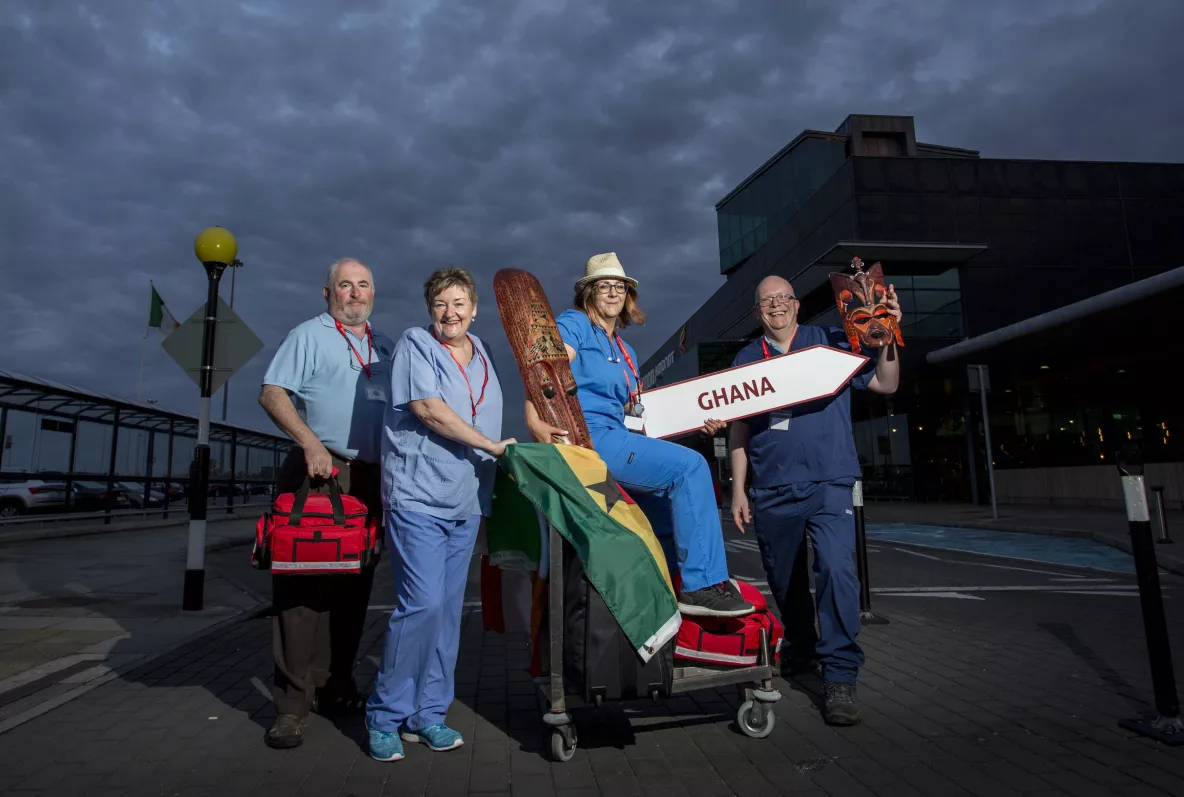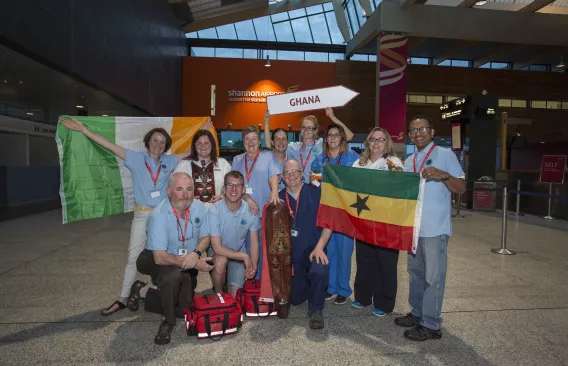
STAFF and students from UL Hospitals Group and University of Limerick have flown out to Ghana for the final phase of a joint effort to establish a pre-hospital emergency care training programme in the remote Upper West region of the African nation.
Now in its third year, Learning for Lives – Ghana, a collaborative programme run by UL Hospitals and UL in partnership with the national health service of Ghana, has provided primary healthcare staff in the Upper West and its capital Wa with crucial life-saving skills that will benefit the almost one-million strong population of the region.
Departing from Shannon Airport on Saturday morning, the delegation of practitioners and academics in medicine, paramedics, physiotherapy, dietetics, nursing and midwifery embarked on the final phase of an ambitious commitment to provide training for 240 rural community health public service workers in three years.
Teams have travelled annually to Ghana since 2017, delivering skills training in general pre-hospital emergency care, and providing specialist instruction in sepsis, hand hygiene, and physiotherapy.
In 2018, the programme included a Train the Trainer course to ensure continuity of training standards at local level, by and for the primary healthcare workers who form the backbone of the health service in the Upper West. Separately, doctors and nurses drawn from eight hospitals in the region have received more advanced training, and each of the hospitals provided with essential life-saving equipment for airway, breathing and circulatory injuries.
This year, an 11-strong multi-disciplinary delegation will finalise the training and include additional instruction in specialist areas of nutrition and neo-natal care.
The delegation includes Dr. Joe Kelly, Emergency Medicine Consultant, University Hospital Limerick (UHL); Yvonne Young, Assistant Director of Nursing & Lead for Sepsis, ULHG; Katie Sheehan, Operational Director of Nursing, Croom Orthopaedic Hospital, Sheila Bowers, Dietitian Manager, ULHG; Mary Flahive, Senior Physiotherapist and Practice Tutor, UHL; Rosalie Stack, Senior Physiotherapist, Croom Orthopaedic Hospital; Mary Hannon, Clinical Nurse Manager 2, UHL; Prof Roy Philip, Consultant Paediatrician & Neonatologist, UHL & University Maternity Hospital Limerick (UMHL); Rachel Keyes, Neonatal Nurse, UMHL; Mr Frank Keane, Senior Fellow in Paramedic Studies at the University of Limerick Graduate Entry Medical School, and UL Paramedics student Quintain Noonan.
Learning for Lives – Ghana is the realisation of a key strategic objective by UL Hospitals Group to establish links with a developing country. Prioritised by UL Hospitals Group Chief Executive Officer, Prof Colette Cowan, the objective gathered pace when Ghana was identified as the partner location in 2015.
Initial exploratory work was led by the UL Hospitals Group’s then Chief Academic Officer, Prof Paul Finucane, and Katie Sheehan, with crucial input from Dr Kelly Hadfield, founder of the Canadian-based NGO Ghana Medical Help, who was then in the second year of her studies at the Graduate Entry Medical School (GEMS) at UL.
Dr Hadfield, who recently graduated from UL GEMS, wished the Ghana delegation well as they completed what she described as “the largest emergency medicine training program for community nurses that has ever been run in the Upper West Region of Ghana”.
“This unique collaboration improves the basic quality of healthcare for nearly one million people and has helped create the capacity at the community level for basic emergency care. Moreover, by focusing on establishing a cohort of effective local trainers, we have enabled the continuity of this training long after we return home,” Ms Hadfield said.
Speaking about the trip, Katie Sheehan, Operational Director of Nursing, Croom Orthopaedic Hospital, and one of the first from ULHG to visit Ghana, said: “This is a fantastic opportunity for staff here in Ireland to visit rural Ghana and to deliver much needed training. The train the trainer programme we have been delivering in Wa ensures that the training is sustainable.
"The team has become very multi-disciplinary over the past 4 years and we now have a strong varied team that is delivering 7 different trainings this year. Wa is a special place and the medical, nursing and general staff there are so welcoming and have a thirst for learning. It is great to see that humanitarian volunteering is part of the UHL strategic plan. It gives us a chance to give a little back.“
Frank Keane, Senior Fellow in Paramedic Studies at UL GEMS, said: “Having been involved since the commencement of the emergency patient assessment programme, it has been wonderful to view the growth in confidence of over 240 Community Health Public Service (CHPS) workers from the Upper West region of Ghana. Their increased ability to detect the acutely unwell patient will greatly enhance the general wellbeing of the communities they serve. In year two, and again this year, a train the trainer programme will be delivered to provide resilience and sustainability for the programme into the future.”
Dr Joe Kelly, Emergency Medicine Consultant, UHL, said: “It has been a highlight of my time in UL Hospitals to be involved in such a worthwhile endeavour. In a short space of time, we have seen what was an initially ambitious programme to train 240 rural community nurses in Northern Ghana in the basics of pre-hospital emergency care, evolve into a programme with seven different training strands, all aimed at improving community based care to the population of the upper west region of Ghana.
“The effort and commitment of my colleagues is surpassed only by the sense of achievement we feel when we assess our candidates and see first-hand how much they have learned from the focused training sessions. We as healthcare professionals working in Ireland also benefit enormously by observing the innovative ways our Ghanaian colleagues have identified to solve problems that are global in healthcare, such as community-based care and chronic disease management.”
Professor Roy Philip, consultant Paediatrician and Neonatologist, UMHL, added: “The Neonatal team from our Maternity hospital is delighted to be part of this year’s Learning for Lives Ghana project. We hope that the transfer of our skills and the adaptation of the training to cater for the local needs will save the lives of many newborn infants in this resource limited environment.”
The Learning for Lives – Ghana initiative is focused not just on skills training on the ground, but also on laying the foundation for future projects not just in Wa and the Upper West, but other regions in the West African nation.
Wishing the delegation a safe trip, Professor Colette Cowan explained: “When we embarked on this project we did so with the intention of making a real difference in Ghana and forging relationships with hospitals and health systems in a developing country. These relationships support our commitment to research, training, innovation and service delivery through the development of a sustainable healthcare programme for Ghana.
“I am very proud of the team that has travelled to Wa for the last three years. Working closely with our academic partners the University of Limerick on this very important project has been extremely rewarding and we look forward to welcoming everyone back safely and planning our next project together in Ghana,” she added.
